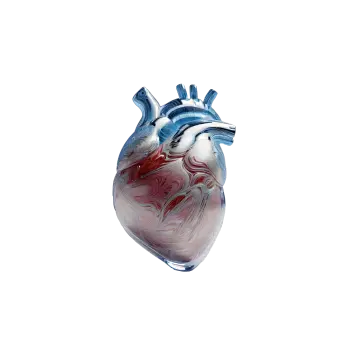Heart and cardiovascular diseases are the leading global cause of death
Heart and cardiovascular diseases are the leading global cause of death, claiming approximately 17.9 million lives annually, according to the World Health Organization (WHO). These diseases encompass various conditions affecting the heart and blood vessels, such as coronary artery disease, cerebrovascular disease, rheumatic heart disease, and others. Unfortunately, more than four out of five deaths due to heart and cardiovascular diseases are attributed to heart attacks and strokes, with one-third occurring prematurely in individuals under the age of 70.
In Sweden, 2 million people are affected by heart and cardiovascular diseases. However, thanks to research, those who suffer from heart disease today live an average of 12-15 years longer than just three decades ago.
Risk factors for heart disease and stroke
The primary behavioral risk factors for heart disease and stroke include an unhealthy diet, physical inactivity, tobacco use, and harmful alcohol consumption. The effects of these behavioral risk factors can manifest in individuals with elevated blood pressure, high blood sugar, elevated blood lipids, and overweight or obesity. These "intermediate risk factors" can be measured in primary care settings and indicate an increased risk of heart attack, stroke, heart failure, and other complications.
Preventive measures proven to reduce the risk
Quitting tobacco use, reducing salt intake, consuming more fruits and vegetables, engaging in regular physical activity, and avoiding harmful alcohol consumption have been shown to reduce the risk of heart and cardiovascular diseases. Health policies that create favorable environments to make healthy choices affordable and accessible are essential in motivating people to adopt and maintain healthy behaviors, as stated by WHO.
Identifying those at the greatest risk of heart and cardiovascular diseases and ensuring they receive appropriate treatment can prevent premature deaths. Access to medications for non-communicable diseases and basic healthcare technologies in all primary care facilities is essential to ensure that those in need receive treatment and counseling.
World Heart Day occurs every year on September 29th
On World Heart Day, observed every year on September 29th, various activities and campaigns are conducted worldwide to encourage people to take care of their hearts by eating healthily, engaging in regular exercise, quitting smoking, and undergoing regular medical check-ups. This day serves as a reminder of the importance of preventing heart and cardiovascular diseases, which are one of the leading global causes of death.
The purpose of World Heart Day is to spread awareness of heart health and urge people to make lifestyle choices that can reduce their risk of heart and cardiovascular diseases while promoting a longer and healthier life.
How you can prevent heart and cardiovascular diseases
Prevention is the key to reducing the impact of heart and cardiovascular diseases. Here are some actions you can take to care for your heart and lower the risk of disease:
- Eat healthily: Include more fruits, vegetables, and whole grains in your diet. Avoid excessive consumption of saturated fats and trans fats. Keep your salt intake in check.
- Exercise and physical activity: Aim for at least 150 minutes of moderate physical activity per week. Strength training and flexibility exercises are also important.
- Quit smoking: Smoking dramatically increases the risk of heart and cardiovascular diseases. Quit smoking as soon as possible.
- Moderate alcohol consumption: If you consume alcohol, do so in moderation.
- Stress management: Use relaxation techniques like meditation and yoga to manage stress.
- Regular health check-ups: Go for regular health check-ups to monitor your blood pressure, cholesterol levels, and blood sugar.
Health checkups for men and women
A healthy heart is the key to a healthy life. Order a health checkup today, choose from our health checkups for men and women, or opt for the comprehensive health checkup to gain insight into your heart and cardiovascular health, along with your values, a medical assessment, and any recommendations. See our offerings below.
























